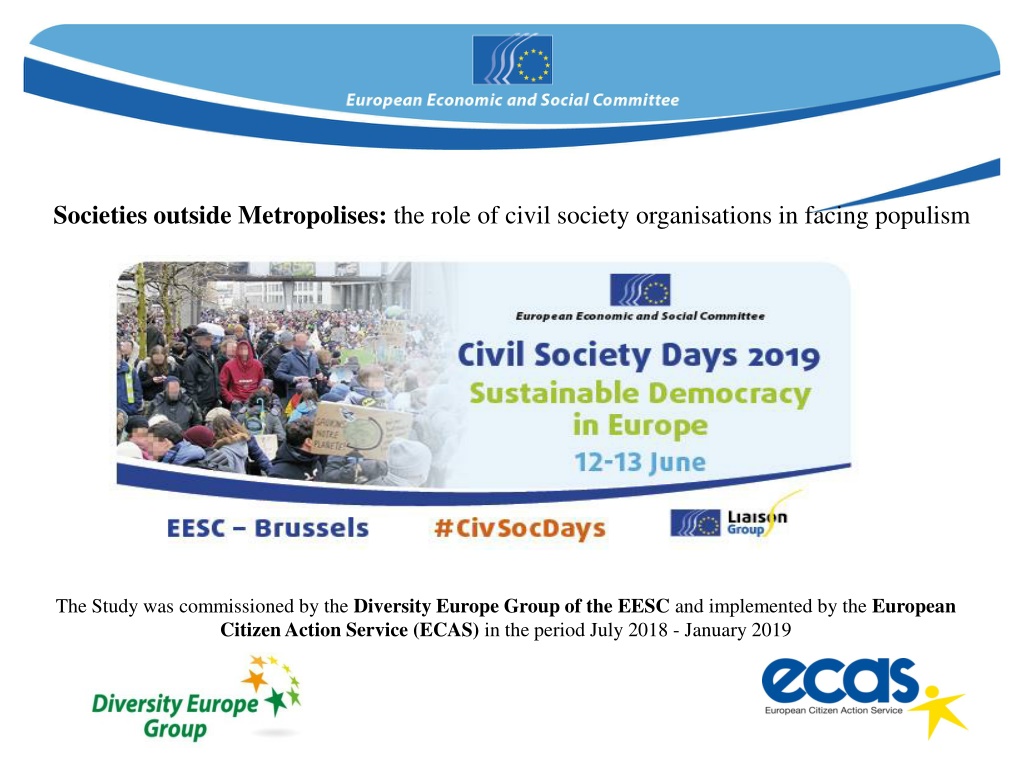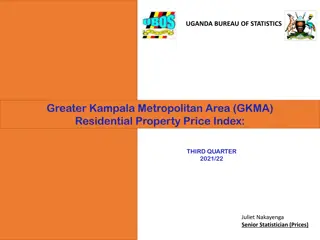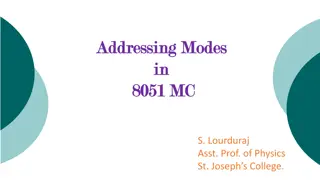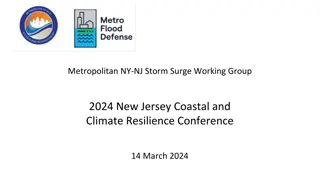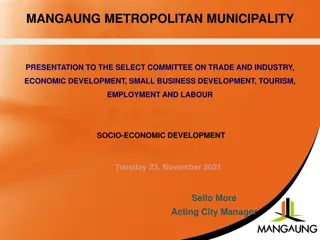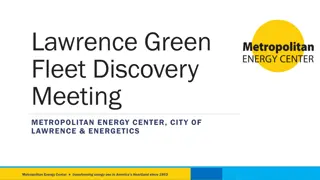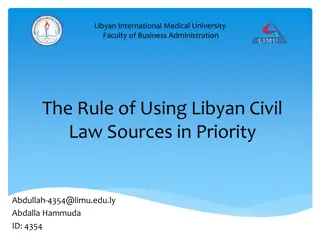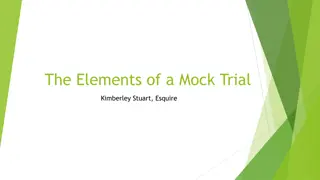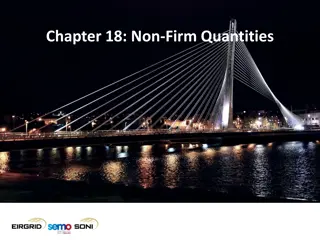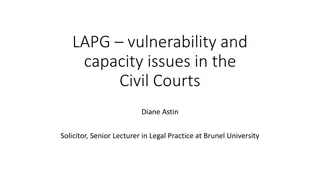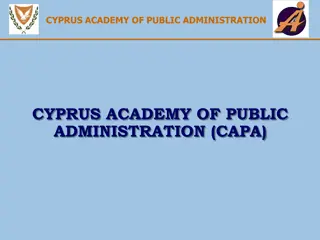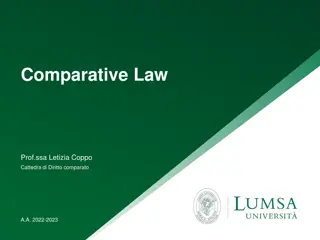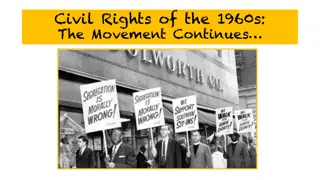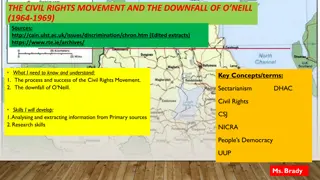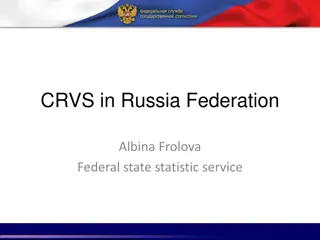Understanding Civil Society's Role in Addressing Populism in Non-Metropolitan Areas
This study commissioned by the Diversity Europe Group explores the influence of civil society organizations in combating populism in non-metropolitan regions across four European countries. Through intensive research methods such as desk research, statistical analyses, citizen surveys, and stakeholder interviews, the study highlights the socio-economic and cultural factors driving populism and emphasizes the importance of civic actions in countering its rise.
Download Presentation

Please find below an Image/Link to download the presentation.
The content on the website is provided AS IS for your information and personal use only. It may not be sold, licensed, or shared on other websites without obtaining consent from the author. Download presentation by click this link. If you encounter any issues during the download, it is possible that the publisher has removed the file from their server.
E N D
Presentation Transcript
Societies outside Metropolises: the role of civil society organisations in facing populism The Study was commissioned by the Diversity Europe Group of the EESC and implemented by the European Citizen Action Service (ECAS) in the period July 2018 - January 2019
Objectives and Regions Twofold Objective Understand the factors influencing citizens choices in favour of populism in non-metropolitan areas and Insight into how civil society organisations (CSOs) operate to counter populism in view of recommending further civic actions Eight Regions in Four Countries: characteristics but all with high populist vote: different socio-economic Klagenfurt-Villach and Nieder sterreich-S d in Austria Dr me and Aisne in France Udine and Reggio di Calabria in Italy P ocki and Nowos decki in Poland
Research Methods Intensive desk research: studies of populism, social and economic data, public opinion polls, election results, CSO databases Two statistical analyses of the relationship between socioeconomic indicators and populist voting patterns on national and regional level An exploratory citizen survey: 616 citizens from the regions shared their political, cultural and social concerns and outlined the issues that inform their voters choices with a focus on populist parties Three focus groups with stakeholders, including CSO activists in the regions of Klagenfurt-Villach and Nieder sterreich-S d in Austria and Dr me in France 54 expert and CSO in-depth interviews at local, national and European level
Socioeconomic and cultural factors of populism Depending on the case, some factors are stronger than others and take precedence in driving populism. No factor alone causes populism - there is an interplay of factors, which feed on and reinforce each other. Anxieties and fears were often invoked by those interviewed to explain the rise of populism as populists employ a manipulation of popular fears as their main tactic. E.g. cultural insecurity explains why the rise of populist political forces also exists in countries where the economic situation is quite good. Factors for populism may vary across different social groups: middle- income groups fear loss of status, while in lower income groups it is the more direct fear of loss of jobs and income. There are differences between the countries as well as between the different regions within the same country geography matters.
Additional Factors of Populism The crisis of representative democracy and the diminished trust in traditional parties. Consequently there is a demand for more direct democracy on behalf of citizens. Strengths and weaknesses of populist parties: good communicators in terms of instrumentally using fears and polarising society but they do not have actual solutions or viable plans for policies beyond their shallow rhetoric. Online disinformation is closely related to populism, and clearly contributing to its rise populists make use of the advantages of social and online media to spread their messages. Euroscepticism has a strong relation to populism because populists find the EU a convenient enemy that they can blame with impunity (they command multiple communication channels and the EU has a poor communication strategy). At a deeper level, the EU represents what the populists stand against - an everyday practice in liberal democracy and transnational cooperation.
The role of civil society organisations in tackling populism Citizens and CSOs do not have clarity of the term populism and it is not recognised as a distinctive type of challenge. CSOs providing social services on behalf of the state/municipalities are well represented in all the regions and there are some examples of civic initiatives in support of migrants, and efforts to tackle online disinformation and support direct democracy. Euroscepticism is, by and large, not addressed, with the exception of Poland where support for the EU is high. The mapping of CSOs active in the areas of promoting EU values, civic education and engagement, civil liberties, direct democracy, support to minorities, refugees and migrants and tackling online misinformation, reveals a marginal number of CSOs implementing activities that can potentially tackle populism. The lowest percentage is in France (0.12% in Dr me of all registered CSOs in the region).
Potentially relevant CSOs in the eight regions in focus Potentially relevant CSOs in the regions Total CSOs in the region Direct democracy and participation Minorities, migrants and multiculturalism Total CSOs relevant Civic education and engagement Civil liberties Country Region % EU values Disinformation KV 4,488 7 2 1 39 0 5 51 1.14% NO-S 3,035 1 0 0 5 0 2 7 0.23% Austria DR 15,181 3 1 0 9 0 8 18 0.12% AI 10,261 2 4 0 8 0 7 19 0.19% France UD 4,494 5 4 1 12 0 0 21 0.47% RC 2,433 2 8 0 14 0 1 23 0.95% Italy PL 682 6 6 0 1 2 1 12 1.76% NW 1,369 8 8 0 4 0 0 17 1.24% Poland Some organisations are active in multiple areas, so the sum of the column of activities and total number at the end may differ.
The role of civil society organisations in tackling populism Encompassing and comprehensive civil society initiatives in tackling populism are lacking due to the complexity of the phenomenon, the shrinking civic space, in terms of lack of an enabling environment for CSOs operation, limited human resources, reduced funding and lack of expertise. There is a need for civil society to be supported in non-metropolitan regions in terms of resources, knowledge, expertise and know how in order to empower it to have capacity to play effectively its role of an intermediary between citizens and decision-makers in countering populism.
10 Recommendations to CSOs and other Stakeholders Develop a knowledge base on populism to inform a tailored approach to tackling its roots and manifestations Invest in formal and informal civic education Restore the public sphere of dialogue and discussion Support civil society at local level Provoke traditional parties to innovate and seek new solutions to citizens concerns exploited by populists Complement representative democracy with collaborative elements of participatory democracy Tackle online disinformation at all levels Strengthen the EU s role and actions as guardian of EU values and democracy in the EU and in Member States Foster EU communication and engagement Boost internationalisation/Europeanisation through exchanges horizontal, vertical and multi-stakeholder involving non-metropolitan areas
DEMOS Democratic Efficacy and the Varieties of Populism in Europe is a research project aiming at better understanding populism. Funded by the EU Horizon 2020 Framework Programme, the project is carried out by 15 partner institutions in Europe and involves 10 disciplines. DEMOS investigates the phenomenon of populism through the lenses of democratic efficacy. The concept combines attitudinal features (political efficacy), political skills, knowledge, and democratic opportunity structures. The concept, a novelty, is understood as a condition of political engagement needed to address the challenges of populism. Partners: Centre for Social Sciences, Hungarian Academy of Sciences (CSS HAS) European Citizen Action Service (ECAS) University of Hamburg (UHAM) Adam Mickiewicz University in Poznan (AMU) Kaunas University of Technology (KTU) Hellenic Foundation for European & Foreign Policy (ELIAMEP) School of Communication and Media (SKAMBA) University for Business Engineering and Management (PEM) Charles University (CU) University of Turin (UNITO) Glasgow Caledonian University (GCU) University of Amsterdam (UVA) University of Copenhagen (UCPH) University of Barcelona (UB) Pantheon-Sorbonne University, Paris 1 (UP)
Thank You for Your Attention! Assya Kavrakova Executive Director assya.kavrakova@ecas.org 21-09-24 Title of the presentation 11
